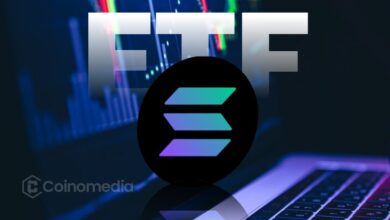BlackRock’s Larry Fink confirms Bitcoin could replace US dollar as global currency amid rising US debt
BlackRock Chairman and CEO Larry Fink officially recognized in his 2025 annual letter to shareholders that Bitcoin can challenge the U.S. dollar’s status as the global reserve currency.
The letter explicitly frames Bitcoin as both a disruptive innovation and a geopolitical risk should the U.S. government fail to rein in debt and deficits. Fink wrote in the firm’s March 2025 letter,
“If the U.S. doesn’t get its debt under control, if deficits keep ballooning, America risks losing that position to digital assets like Bitcoin,”
The comment marks a clear acknowledgment from the head of the world’s largest asset manager that digital assets could represent an alternative to the U.S. dollar in global markets.
Fink mentioned Bitcoin by name seven times throughout the letter while referencing the dollar eight times. The significance of this parallel frequency in Fink’s annual letter cannot be overstated.
A few years ago, who would have thought that Larry Fink would spend as much time talking about Bitcoin as the US dollar in an annual letter to investors?
Bitcoin Adoption Tied to Structural Fiscal Risk
The BlackRock letter outlines a split view that while DeFi is praised as “an extraordinary innovation,” the firm cautions that its growth could undermine America’s financial primacy.
The risk emerges if investors begin treating Bitcoin as a more stable long-term store of value than the U.S. dollar, particularly given ongoing federal deficits and sovereign debt levels.
This framing positions Bitcoin as more than a speculative asset or store of value and as a macro hedge against sovereign instability. The implications parallel similar arguments made in recent years by institutional investors treating digital assets as insurance against monetary debasement or geopolitical volatility.
As Fink emphasized, “two things can be true at the same time,” referring to the coexistence of innovation and risk in digital asset development.
Record-Breaking Demand for BlackRock’s Bitcoin Products
BlackRock’s internal positioning on Bitcoin is not purely theoretical. The letter disclosed that its U.S.-based Bitcoin ETF became the largest product launch in the history of the ETF industry, reaching over $50 billion in assets under management within its first year. It also ranked third in net asset inflows across all ETF categories, behind only SP 500 index funds.
Retail adoption was a key driver, with more than half the demand for the firm’s Bitcoin ETP coming from individual investors. Notably, three-quarters of those participants had never previously owned an iShares product, suggesting Bitcoin is acting as an onboarding mechanism for a new demographic of investors.
The firm has also expanded its ETP offerings into Canada and Europe, signaling cross-border growth in institutional-grade Bitcoin investment vehicles.
Tokenization Positioned as Infrastructure Evolution
Beyond Bitcoin, Fink’s letter advanced a broader thesis that tokenization could transform capital markets in ways comparable to the shift from postal mail to email. Drawing a comparison to the SWIFT network, Fink argued that tokenized asset infrastructure could bypass traditional financial intermediaries by enabling instant, peer-to-peer asset movement.
BlackRock sees tokenization as a foundational shift in asset ownership, mainly through fractionalization, improved voting systems, and increased access to high-yield investment instruments.
According to the letter, these developments could democratize capital markets by lowering the operational and legal barriers that have historically limited retail investor participation in certain asset classes.
The firm also emphasized the need for updated digital identity systems, citing India’s model as a benchmark. According to the letter, over 90% of Indians can securely verify smartphone transactions, positioning the country as a leader in the digital infrastructure necessary for tokenized economies.
Implications for Digital Asset Policy and Markets
The inclusion of Bitcoin as a potential replacement for the dollar reflects a material shift in institutional perception. While mainstream recognition of Bitcoin as “digital gold” has grown in recent years, BlackRock’s language points to a deeper economic thesis—one in which macroeconomic policy failure could accelerate a pivot to decentralized monetary systems.
By citing both tokenization and Bitcoin within the same strategic outlook, the letter presents a framework where digital assets are possible systemic alternatives to fiat.
For policymakers, the message is implicit but pointed: the U.S. must modernize its financial systems and manage its debt trajectory to maintain monetary leadership.
The post BlackRock’s Larry Fink confirms Bitcoin could replace US dollar as global currency amid rising US debt appeared first on CryptoSlate.
Disclaimer: The content of this article solely reflects the author's opinion and does not represent the platform in any capacity. This article is not intended to serve as a reference for making investment decisions.
You may also like
Grayscale Files Updated S-1 for Spot Solana ETF
Grayscale updates its SEC filing for a spot Solana ETF, signaling growing institutional interest in SOL.Grayscale Pushes Forward With Solana ETF PlansWhy Solana?What This Means for the Market

AMPUSDT now launched for futures trading and trading bots
Memecoin platform Clanker records millions in revenue in five months of operation
Solana Whales Take Profits After Million-Dollar Staking Unlock
